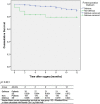Risk Factors and Outcomes for Postoperative Delirium after Major Surgery in Elderly Patients
- PMID: 26291459
- PMCID: PMC4546338
- DOI: 10.1371/journal.pone.0136071
Risk Factors and Outcomes for Postoperative Delirium after Major Surgery in Elderly Patients
Abstract
Background: Early identification of patients at risk for delirium is important, since adequate well timed interventions could prevent occurrence of delirium and related detrimental outcomes. The aim of this study is to evaluate prognostic factors for delirium, including factors describing frailty, in elderly patients undergoing major surgery.
Methods: We included patients of 65 years and older, who underwent elective surgery from March 2013 to November 2014. Patients had surgery for Abdominal Aortic Aneurysm (AAA) or colorectal cancer. Delirium was scored prospectively using the Delirium Observation Screening Scale. Pre- and peri-operative predictors of delirium were analyzed using regression analysis. Outcomes after delirium included adverse events, length of hospital stay, discharge destination and mortality.
Results: We included 232 patients. 51 (22%) underwent surgery for AAA and 181 (78%) for colorectal cancer. Postoperative delirium occurred in 35 patients (15%). Predictors of postoperative delirium included: delirium in medical history (Odds Ratio 12 [95% Confidence Interval 2.7-50]), advancing age (Odds Ratio 2.0 [95% Confidence Interval 1.1-3.8]) per 10 years, and ASA-score ≥3 (Odds Ratio 2.6 [95% Confidence Interval 1.1-5.9]). Occurrence of delirium was related to an increase in adverse events, length of hospital stay and mortality.
Conclusion: Postoperative delirium is a frequent complication after major surgery in elderly patients and is related to an increase in adverse events, length of hospital stay, and mortality. A delirium in the medical history, advanced age, and ASA-score may assist in defining patients at increased risk for delirium. Further attention to prevention of delirium is essential in elderly patients undergoing major surgery.
Conflict of interest statement
Figures
References
-
- Bekker AY, Weeks EJ (2003) Cognitive function after anaesthesia in the elderly. Best Pract Res Clin Anaesthesiol 17: 259–272. - PubMed
-
- Bilotta F, Doronzio A, Stazi E, Titi L, Zeppa IO, Cianchi A, et al. (2011) Early postoperative cognitive dysfunction and postoperative delirium after anaesthesia with various hypnotics: study protocol for a randomised controlled trial—the PINOCCHIO trial. Trials 12: 170 10.1186/1745-6215-12-170 - DOI - PMC - PubMed
MeSH terms
Substances
LinkOut - more resources
Full Text Sources
Other Literature Sources
Medical


